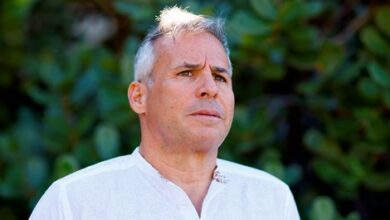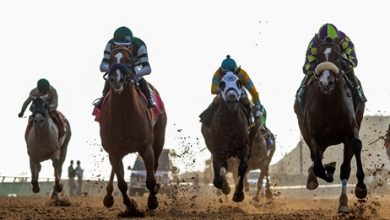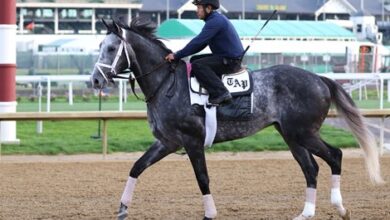Saudi Cup Plays in Parallel Racing Universe
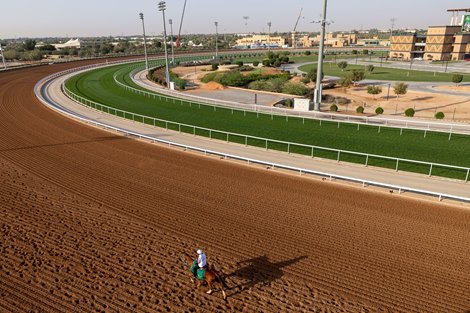
Rick Dutrow was asked this week where a victory in the Saudi Cup (G1) would sit among the major races he has won as a trainer.
“On top,” Dutrow replied. “I’d rather win this race than any race in the world.”
So there you have it. From the mouth of Babe. Kentucky Derby (G1)? Old news. Breeders’ Cup Classic (G1)? Been there and done that, twice. Bring on that true test of the Thoroughbred racehorse—a one-turn mile and one-eighth—and sit back as White Abarrio walks his beat Saturday night in Riyadh. Dutrow’s cut of a potential $10 million payday won’t make up for the 10 years he was suspended, but every little bit helps.
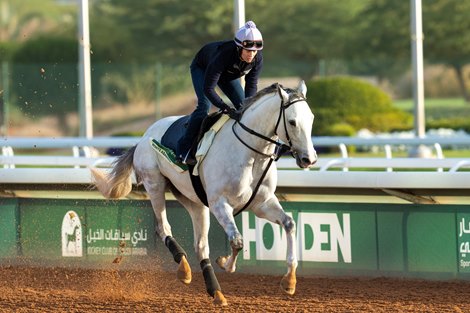
White Abarrio trains Feb. 20 ahead of the Saudi Cup at King Abdulaziz Racecourse
The Saudi Cup is a $20 million horse race carved out of the sportswashing corner of the kingdom’s $776 billion Public Investment Fund controlled by Crown Prince Mohammed bin Salman Al Saud. In other words, couch change, although more than enough to lure owners and trainers from an international array of racing nations, including the United States, Japan, and…that’s about it, other than a runner from Dubai, which for him is like shipping to Aqueduct Racetrack from Delaware Park.
Those of us lacking enthusiasm for the Saudi-sponsored extravaganza because of the climate in which it is presented are always braced for the what-about brigade. Politics and horse racing don’t mix, goes the chant. So what if Saudi Arabia is known for its barbaric treatment of women and its suppression of dissent? Stuff like that happens in Western countries all the time, right?
To test that angle, let’s send a plane-load of PETA protesters to call for the end of racing and picket outside King Abdulaziz Racecourse on Saturday, as they did last summer at Saratoga Race Course. Or how about a scene in Riyadh similar to the scores of Louisville, Ky., citizens who demonstrated at Churchill Downs in the wake of the police shooting death of Breonna Taylor?
Chances are, they would receive the same treatment as Saudi activist Mohammed al-Otaibi, who was given a 17-year jail sentence because he founded the Union for Human Rights. Or Abdulrahman al-Sadhan, whose critical comments about human rights issues on a Twitter account got him a 20-year sentence. Or Palestinian-born author Ashraf Fayadh, who has been in a Saudi prison since 2013 for blasphemous poetry and unlawful relations with women.
And they got off lucky. The list of crimes punishable by death in Saudi Arabia—customarily by beheading—ranges from rape and murder to adultery, homosexuality, and witchcraft. Visitors who attended the 2022 Saudi Cup won by local horse Emblem Road could have lingered an extra two weeks to witness the executions of 81 men in Riyadh’s notorious “Chop-Chop Square” in a single day.
Politics aside, the aesthetics of a one-turn mile and one-eighth race on dirt simply do not merit a $20 million purse. Horses should have to work a whole lot harder to bank that kind of swag. Nominations from the floor will be accepted to name the world’s second-most significant mile and one-eighth dirt race around one turn. Anyone? Anyone? Bueller?
Money, though, buys credibility, at least for a while. Delta Downs created the $1 million Delta Downs Jackpot Stakes (G3) for late-season 2-year-olds and eventually ‘bought’ a grade 3 rating for a time. Sunland Park jacked its Sunland Park Derby (G3) purse to $800,000 in pursuit of graded stakes status and a place on the Kentucky Derby points list and landed both. But don’t look for sustainability in such models. The Delta Jackpot folded in 2017, while the purse for the Sunland Derby has been cut in half and its grade is edging south.
Those races were bolstered by slots, and slot deals can be fickle. When government-backed interests get involved, the sky is the limit. In 1996 the first Dubai World Cup was worth $4 million of advertising for the tiny emirate, briefly edging the $3 million Breeders’ Cup Classic for main track primacy. By 2019 the World Cup was up to $12 million, and then came the $20 million Saudi Cup, a wholly owned subsidiary of the crown, blowing Dubai out of the water.
When Charles “Doc” Strub advertised the first hundred-grander in 1935, the winner of the Santa Anita Handicap took down $108,400. (That same year, Omaha collected $100,325 for winning all three jewels of the Triple Crown.) When Joe Joyce put up a nice, round million dollars for a turf race at Arlington Park in 1981, the next best purse for older horses was the $500,000 offered by the Jockey Club Gold Cup (G1) on dirt.
Discovery, Equipoise, and Seabiscuit provided credibility for those early Santa Anita Handicaps and set the race on a strong path while John Henry put the Million on the map for a long, satisfying history until Arlington was closed. Four years into its run, the Saudi Cup still needs a bonafide star to carry its name.
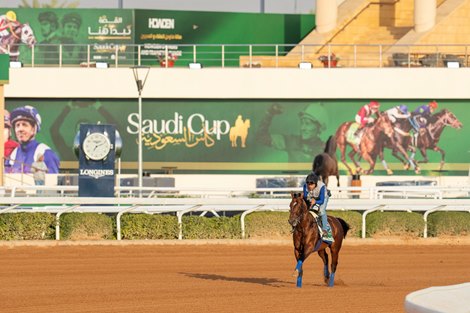
Classic winner National Treasure will aim for more riches Saturday at King Abdulaziz Racecourse
Last year’s winner Panthalassa , now retired, lost 20 of 27 starts. Emblem Road, who won at odds of 113-to-1, has not been heard from for nearly a near. Mishriff , the turf horse who scored in the second Saudi Cup, could not sustain a brilliant 2021 campaign and retired on a slide of nine losses. Then there is Maximum Security , the U.S. 3-year-old male champion of 2019 who defeated fellow champion Midnight Bisou in the inaugural Saudi Cup. We know how that turned out.
It was not the Saudi Cup’s fault that Jason Servis, the trainer of Maximum Security, was subsequently convicted of charges relating to doping his horses. Despite the fact that the colt tested clean after the Cup, according to Saudi officials, the $10 million purse was withheld pending investigations. Investigations into what was never fully explained.
Four years later, Servis is in a minimum security facility in Florida, and Maximum Security will have 2-year-olds racing this summer. In January, the Jockey Club of Saudi Arabia recommended that the JCSA Stewards Committee officially strip Maximum Security of his Saudi Cup victory. There was no reference to Midnight Bisou being named the winner, as is the custom in such disqualifications. Nor was the disposition of the $6.5 million difference between first and second prize mentioned. Jeff Bloom, whose Bloom Racing owned Midnight Bisou at the time, was asked last year if the check was in the mail.
“The expectation was that there would be a resolution when Jason Servis pled guilty and became a convicted felon, and that Maximum Security was singled out as a horse who he admitted received the illegal substances at some point,” Bloom said. “Based on the timeline so far, I think we’ll find out in about 10 years.”


